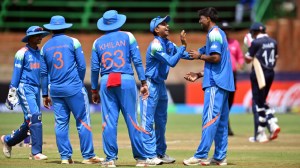The goal gluttons
Indian hockey hasn8217;t yet found its Lalit Modi nor are they planning a Twenty20 kind of spectator-friendly new format. But last week in Chennai as it rained goals, the Asia Cup witnessed scenes quite similar to the ones being witnessed at cricket grounds in South Africa these days. Here8217;s profiling the two modest men with a sub-zero glamour quotient 8212; Prabhjot Singh and Shivendra Singh 8212; who brought the national game in focus once again

PRABHJOT SINGH
FORM GROUND ZERO TO DIZZY HEIGHTS
Sandeep Narayan
Within hours of being tossed up in the air by teammates for his 15-goal tournament-winning effort at the end of the Asia Cup, Prabhjot Singh was literally among the clouds. His keenness to honour club commitments in Germany meant the in-form forward didn8217;t have much time to celebrate on ground zero as the dizzy heights beckoned.
But as one catches him on phone in Germany, the starry tantrums of a typical jet-setter are missing. Prabhjot still remains the silent, soft spoken and perhaps the most enigmatic figure of Indian hockey in recent times.
Time zone confusion and the resulting calculation gone wonky meant that one gets through to Prabhjot well past midnight in Europe. One finds out later that it had been a long day on the field for him and the long distance call had disturbed his blissful sleep. But the response to being asked for a brief chat is a friendly dasso 8212; Punjabi for shoot.
The mere mention of the word Chennai 8212; the Asia Cup venue 8212; gives Prabhjot the cue. 8220;It8217;s been great, almost like a dream. One minute you are out of the team, the next you8217;re being hoisted in the air by your teammates, surrounded by a cheering crowd,8221; he says. That8217;s when one realises that Prabhjot8217;s ground zero to dizzy heights transition at Chennai isn8217;t just to do with airline schedules.
It was back in 2005, during the Champions Trophy at Chennai, that he lost his place in the national team and also in the hearts of fans. His meaningless runs down the flanks and needless dribbles were blamed for India8217;s forgettable run in the tournament and Prabhjot, even today, is ready to own up that mistake.
8220;When I lost my spot in the team it was simply because I was not scoring. In the Champions Trophy I could not convert any of the chances. I was trying to hog most of the possession. I failed and so I suffered,8221; is his candid confession about that debacle.
But this time at Chennai, things were different. His runs down the flanks and dribbles resulted in India scoring 57 goals through the tournament as talks about the return of India8217;s glory days in hockey were triggered. According to Prabhjot, the reason for the turnaround in his form was a simple motto that he religiously adopted post 2005: perform and you shall be rewarded.
While most players tend to point fingers at the selection processes and blame the Indian Hockey Federation8217;s in-house politics for their absence from the national squad, Prabhjot didn8217;t take that path. 8220;Scoring goals 8212; that8217;s all I had to do. I toughened myself up and told myself that my career was not over. That I will continue playing well till they recall me,8221; he says. This meant he participated in nearly all domestic tournaments and soon he was on the score-sheet in most games. 8220;See, I believe that there is always a door open, we just have to find it. If I had let the frustration get to me, I may not have come back,8221; he asserts.
His brother Charanjit Singh, the second best hockey player in the family, recalls the days when Prabhjot was not in the national side.
8220;He would never complain, never really lost his temper when he was at home. He kept to himself and to hockey. He would play in all competitions, domestic or even abroad. Nothing was too small to miss or let go,8221; says Charanjit.
The elder brother also speaks about Prabhjot8217;s initial days on the hockey field and how the family realised that the youngster was made for bigger things. 8220;Once we had gone out with our father and that8217;s when Prabhjot and I saw some kids playing hockey. He was five then. After that he forced our father to buy him a stick. Since then, he can rarely be seen without it. The sticks might have changed but his dedication for the game remains the same,8221; Charanjit adds, indulgently.
He also remembers the time when they used to play hockey as kids and how he would be forced to hide Prabhjot8217;s stick just to escape the humiliation of defeat. 8220;He was just too good and I got so sick of losing to him that I decided to hide the ball or his stick just to avoid another loss. Losing to someone three years younger isn8217;t the best thing that can happen to you when you are young,8221; he laughs.
8220;But it8217;s turned out to be good. He had that magic, to score whenever the ball came his way,8221; he says.
This magic first got bigger attention during the Junior World Cup at Hobart in 2001. With India winning the title, it was seen as the coming-of-age performance by India8217;s golden generation. Virtually every member of that team went on to play for India but gradually, mostly faded away. Many still remain in contention, but at present Prabhjot happens to be the flag-bearer of that generation of talented players.
But the road ahead for India, as also for Prabhjot, is tough. India are yet to qualify for the Beijing Olympics and in the coming days the in-form forward will have the focus on him again. After his own transition from ground zero to dizzy heights, India will bank on him to do the same for the collective fortunes of the team.
SHIVENDRA SINGH
RAILMAN SOARING
Shivani Naik
For a housing colony a whistle-blow away from the bustling Andheri railway station with its unparalleled chaos, Shivendra Singh8217;s living quarters in Mumbai are unusually serene. Plonking himself on a garden bench, Singh is comfortable clutching his kit-bag rather than resting it down, and the whir of a chopper flying some distance above distracts him more than a nearby rail engine8217;s chugging sound. The Indian forward8217;s days of startling at the oblique passing of a train are over; airplanes taking off from the nearby Sahar terminal hold his gaze now.
For a gangly boy whose parents in Gwalior thought him physically too weak to allow him a brush with a hockey stick which elder brother Shailendra carried around with more elan, the 24-year-old8217;s ascent to becoming India8217;s mainline power-packed forward has been unusually fast.
Getting India the early goals in Chennai, Shivendra, in the company of Prabhjot, had rival defences scurrying as he sped in from the right and added to 8212; or aided 8212; the scoring during the week-long goal-gluttony at the Mayor Radkakrishnan Stadium.
The curly-mopped Mumbai man 8212; currently with Western Railway 8212; hadn8217;t forgotten a similarly speedy strike against Korea at the World Cup exactly a year ago. The euphoria was followed by a distinctly gutted feeling, as within an hour it all came to naught when India eventually lost 1-2 and hurriedly folded their disastrous showing in Germany. Finishing, he had learnt, with the rest of the ruing country, would be sovereign to success.
The only hanging-piece adorning his home8217;s simple walls is a satin poster of that hurtful Monchengladbach campaign, painted with the participation flags of the world8217;s top hockey nations. There are no darts around to fling at the chart, but Shivendra is known to eye each one evenly when he8217;s home.
8220;I finished as the top Indian goal-scorer in the pool phase, but we lost. So I don8217;t think it was a good tournament,8221; he defines his new standards. National coach Joaquim Carvalho 8212; best-placed to judge the youngster8217;s progress says: 8220;Of the last three to four events, the Asia Cup has been his best.8221;
Carvalho had accompanied a skinny Shivendra in the Maratha Warriors8217; maiden PHL year as manager, and the then rookie had impressed with his speed and skill, though not much with his strength and vigour. 8220;Earlier, he didn8217;t have the strength, but in Chennai he was consistently out-beating the Korean defenders. I8217;ve stressed on strength training so that the players get power in their runs. His goal-scoring ability and deception stands out,8221; says Carvalho, who watched his top two forwards go all-out in attack and fall back with the same alacrity to defend.
In fact, everyone is working harder, and when used in short bursts, have managed to load in 100 per cent intensity in their 5-10 minute-stays, as Carvalho works substitution to India8217;s advantage.
Shivendra8217;s need for speed came early. It was the time when he was still trying to break into the established set-up at SAI, Kandivali, Mumbai. 8220;That was a big struggle,8221; he recalls. 8220;I8217;d left home and come to Mumbai. My family wasn8217;t keen initially because economically we weren8217;t exactly well off.8221;
SAI hostel trials in Class 8 were frowned upon by his father who insisted on him giving his 10th boards. And travelling to Mumbai, he was paranoid about having to wash his own clothes!
Domestic chores apart 8212; there was a seniors-heavy team to make way into, and it is since those SAI days that he extended his practice hours beyond the team8217;s two hours. 8220;Even later with Western Railway, he8217;d go off and practice shooting alone for two more hours after the team had packed up,8221; remembers his local coach Sunil Kumar. Playing left out once 8212; then centre forward 8212; and now on the right 8212; he8217;s as adaptable as they come.
Dodging, on the other hand, was an obsession. A kiddish fancy even, as he picked his defenders before a match and went after them. 8220;Shiven had this habit of deciding he8217;d dodge a particular man to get the goal. Once he broke down and cried because a red card suspension wouldn8217;t allow him to chase one targetted defender of Northern Railway. When the officials let him play, he promptly went past the said man and scored,8221; Kumar laughs.
8220;And he still has a child8217;s mind off the field,8221; the coach adds. As a youngster, he idolised Dhanraj Pillay and Shahbaz Ahmed and there was respect for the Dutch penalty-guru Toon Siepman. But flipping channels, he went straight into the realm of toons Tom and Jerry and Spiderman. 8220;He doesn8217;t watch anything except Cartoon Network,8221; says room-mate Amit Pandey 8212; Singh8217;s off-action persona a perfect foil to his on-the-field aggro.
8220;It8217;s good when he8217;s around 8212; I don8217;t need to worry about the house-work and cooking,8221; Pandey lets out the secret of the Indian forward8217;s culinary skills 8212; kadhi-chawal being the chef8217;s recommendation.
But taking off to Germany, Shivendra Singh has a few other things on his menu. A clutch of defenders, for starters.
- 01
- 02
- 03
- 04
- 05































